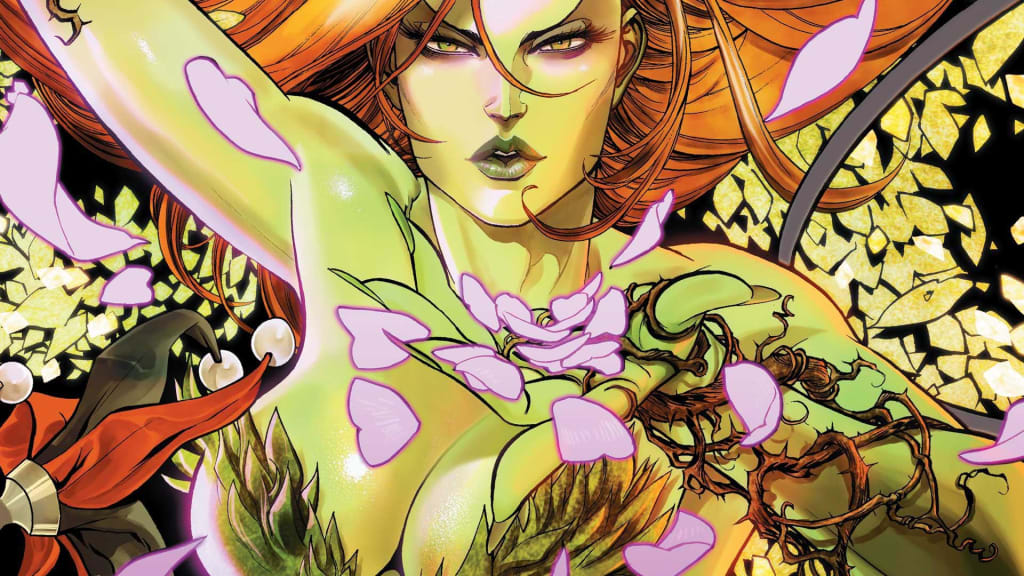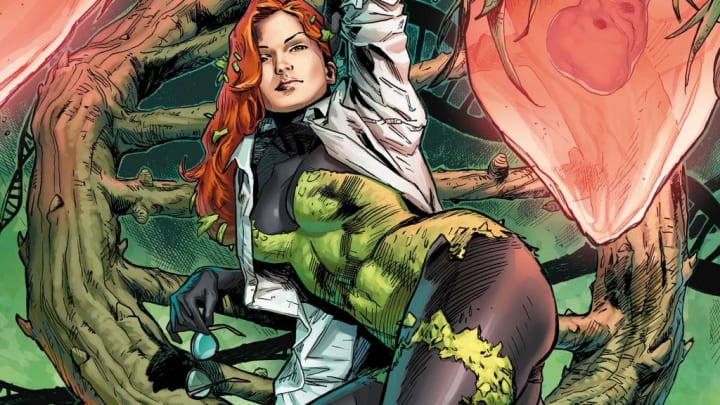How To Build Poison Ivy in The Pathfinder RPG
A Character Conversion Guide

In her original life, Dr. Pamela Lillian Isley was something of a shrinking violet. Dedicated to her work, she was naive, and easily led astray. The victim of casual experimentation, Pamela developed strange abilities like an immunity to toxins, and a strange affinity with plants. She also suffered from violent mood swings, and adopted the persona of Poison Ivy. Known primarily as an eco-terrorist, Ivy is not someone you want to cross. For those looking to bring a version of her to your Pathfinder game, here's a simple guide to get you started.
Also, if you're looking for other members of the Rogues' Gallery, or characters from the Avengers, Gotham's vigilantes, or even the cast of Game of Thrones, the Character Conversions page on Improved Initiative has you covered. And if you're looking for even more geek and gaming related content, take a moment to check out my full Vocal archive as well!
Roots (Attributes, Race, and Traits)
Pamela Isley is something of a unique case in Gotham City, in that her biology has been completely altered by her powers. In many ways, she's no longer human. Or at least not fully human. To that end one of the most fitting starting races for her rebirth is the half-elf. And, if you want to play into the fact that her very blood is poisonous, you could give her the Poison Minion racial trait, which replaces the normal elven immunities and keen senses traits.
When it comes to her attributes, it's important to remember that, for all her sensuality, Ivy's greatest weapon is her mind. As such, Intelligence should be her primary attribute, followed by Charisma. How you arrange the rest of her attributes will depend on if you're going to make your Ivy a more physical presence, getting into the thick of battle and throwing punches, or if you're going to have her take a back seat to the brawling, focusing more on her plant abilities and her unusual concoctions.
When it comes to your Ivy's traits, you need to choose options that will fit your concept, and still be useful. For example, Alchemical Adept (+2 trait bonus on Craft Alchemy checks, and when you fail a craft check by 5 or more, but don't roll a natural 1, you don't lose any raw materials) might suit you if you intend to make your own materials and equipment. Feral Speech (choose a new language off a list, including druidic and sylvan) might be thematic for your version of Ivy, and you can never go wrong with basic traits like Reactionary (+2 trait bonus on initiative checks).
The Stalk (Classes and Class Abilities)

Ivy is a highly-educated scientist, in addition to being a strange merging of plant and human. The obvious class for her is the Alchemist, especially when you consider it grants poison use and eventual poison immunity, but if we're getting into specifics then the Bramble Brewer archetype from the Advanced Race Guide, and the Horticulturist from Ultimate Wilderness change the class abilities in truly unique ways that fit Ivy's power set.
The Bramble Brewer has a unique mutagen that operates differently from the standard array. The Dendrite Mutagen still grants a natural armor bonus, and +2 to one physical stat along with a -2 to the corresponding mental stat, but if the user is standing in an area of direct sunlight (like being outside, or in a daylight spell), then she also gains fast healing 1. These changes continue through Greater Mutagen and Grand Mutagen, too. The other, major change is that at level 2 a Bramble Brewer gains the tanglefoot bomb discovery, but with a twist. The entanglement effect continues for a number of rounds equal to your Intelligence modifier, but tanglefoot bombs also deal no damage. Instead, they turn all the squares in the splash radius into difficult terrain. And, for every 1d6 points of damage the bomb would have dealt, the splash increases by 5 feet.
The horticulturist, on the other hand, grants you the ability to speak to all plants, allows you to summon creatures and give them the plant template, and even gives you a plant familiar. At level 14 you even gain Liveoak, animating an oak tree to act as a guardian. For players who want to be less in the thick of things, and who aren't shy about using minions to do the heavy lifting, this option might be more fitting.
That takes care of Ivy's toughness, her ability to heal like a plant, and her power to entrap her foes with relative ease. But what about her most infamous power? You know, the ability to charm a target into helping her?
Well, there are two functional ways you can replicate this, though these solutions work only to charm, and they're not total mind control. Ivy's hold is stronger on some minds then others, after all. The first method is to take the Spell Knowledge Discovery, which allows you to select a single arcane spell off the sorcerer/wizard list. Charm Person is a good choice, and you can take that relatively early on. Not only that, but because you cast it like an arcane spell (even though it takes up an extract slot) you could increase the save DC through feats like Spell Focus.
The second method, though, is the one your author prefers, because it makes the charm an inherent ability, instead of a spell that gets prepared. You take 2 levels of Rogue, and the Extra Rogue Talent feat, in order to gain Minor Magic and Major Magic. Major Magic would let you pick Charm Person as a spell-like ability that you can use twice per day, and you could modify it with monster feats that improve spell-like abilities. The save DC is going to be 11 + your Intelligence modifier, which should be substantial as an alchemist, and which could be made more substantial through Discoveries like the Cognatogen, if you choose to take it.
Once you've decided which path you want to take to give Ivy her mind-altering ability, there are a few other Discoveries you should think about adding to your list. Concentrate Poison, Smoke Bomb, Poison Bomb, Spontaneous Healing, and Healing Touch are all solid choices.
The Thorns (Feats and Skills)
Feats and skills are often a character's bread and butter. For Ivy, many of her skills are obvious. Knowledge (Nature), Perception, Craft (Alchemy), Intimidate, Heal, and Diplomacy are all solid choices. Knowledge (arcana), Use Magic Device, and Survival are also appropriate choices.
When it comes to Ivy's feats, there are some core recommendations. The first group will allow you to really bring home her strange transformation, and her identification with plants.
- For your half-elf bonus, select Skill Focus Knowledge (Nature) [Core Rulebook 134]. This grants you a +3 on checks until you have 10 ranks, at which point you gain a +10.
- At level 3, take Eldritch Heritage (Verdant Bloodline) [Ultimate Magic 149]. At 3rd level, this grants you the ability to shoot a vine from your hand to trip, steal, or disarm an enemy, using your sorcerer level as your BAB. Not the greatest power, but a handy one.
- At Level 11 and 13 take Improved Eldritch Heritage (Verdant) [Ultimate Magic 152]. This grants you the Photosynthesis and Massmorph abilities of the Verdant sorcerer bloodline. The former allows you to subsist off of water and sunlight, and you're treated as if you have a ring of sustenance. The latter allows you to increase or decrease the size of plants, and to use tree shape on willing, non-plant creatures.
Other than adding plant powers to your version of Ivy, which feats you take will depend entirely on your role. For example, if you decided to take Quicken Spell Like Ability (Bestiary), then you could use your charm spell-like ability as a swift action, instead of a standard one. If you are planning on using a lot of alchemical items in combat, then Point Blank Shot and Precise Shot (Core Rulebook 131) will be greatly advantageous for you. Extra Discovery (Advanced Player's Guide 169) would allow you to gain more Discoveries, which would broaden your access to alchemist class abilities. Particularly useful if there are more Discoveries than feats you'd find useful.
The Petals (Gear and Story)
Like many villains in Gotham, Ivy is defined more by what she is than by any signature pieces of equipment. Though she'll need an alchemist's lab to prepare her extracts, and a handy haversack for carrying all of her nasty surprises is likely a good investment, those are purely optional touches.
Then we come to her story. Poison Ivy, like so many other characters who've been in the DC Universe for a while, has had more than her fair of ret cons. She's been a jilted lover poisoned with herbs from a pharaoh's tomb, a naive subject of experimentation, and several other strange origins. So, when you make your version of Ivy, ask which official story you're paying homage to. Or, simply throw the established origin of the character out the window, and create something fitting for the world and game you're playing in. She's your character, so make her what you want her to be, and what fits the game you're bringing her to.
If you're looking for more inspiration, consider checking out some of the following supplements:
- 100 Cults to Encounter: With organizations like the Gardeners in its pages, this collection can provide an interesting cult who may be responsible for your Ivy. Whether they performed the ritual that made her what she is, or she was raised by them, it entirely up to you.
- 100 Prisoners For a Fantasy Jail: If you're looking for former cellmates Ivy may have previous relationships with (or to whom she might owe a favor), this collection is full of the strange and bizarre when it comes to those who fill the state's cells.
- 100 Gangs For Your Urban Campaigns: While Ivy doesn't usually have a gang as such, she could easily contract one to do her dirty work for her. Especially if she doesn't want people to realize she's behind a particular crime wave. If you're looking for specific individuals, whether they're allies or rivals, you might also want to check out 100 Random Bandits to Meet.
About the Creator
Neal Litherland
Neal Litherland is an author, freelance blogger, and RPG designer. A regular on the Chicago convention circuit, he works in a variety of genres.
Blog: Improved Initiative and The Literary Mercenary






Comments
There are no comments for this story
Be the first to respond and start the conversation.